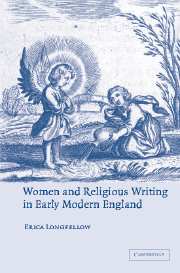Book contents
- Frontmatter
- Contents
- Acknowledgements
- Abbreviations
- Note on transcription and citation
- Introduction
- 1 ‘Blockish Adams’ on mystical marriage
- 2 Ecce homo: the spectacle of Christ's passion in Salve deus rex judæorum
- 3 Serpents and doves: Lady Anne Southwell and the new Adam
- 4 Public worship and private thanks in Eliza's babes
- 5 Anna Trapnel ‘sings of her Lover’
- 6 The transfiguration of Colonel Hutchinson in Lucy Hutchinson's elegies
- Conclusion
- Bibliography
- Index
- Index to scripture passages
1 - ‘Blockish Adams’ on mystical marriage
Published online by Cambridge University Press: 22 September 2009
- Frontmatter
- Contents
- Acknowledgements
- Abbreviations
- Note on transcription and citation
- Introduction
- 1 ‘Blockish Adams’ on mystical marriage
- 2 Ecce homo: the spectacle of Christ's passion in Salve deus rex judæorum
- 3 Serpents and doves: Lady Anne Southwell and the new Adam
- 4 Public worship and private thanks in Eliza's babes
- 5 Anna Trapnel ‘sings of her Lover’
- 6 The transfiguration of Colonel Hutchinson in Lucy Hutchinson's elegies
- Conclusion
- Bibliography
- Index
- Index to scripture passages
Summary
The treatment of mystical marriage among seventeenth-century religious writers is a broad subject – the first half of the century witnessed the publication of numerous commentaries, sermon collections, translations and verse paraphrases of Biblical mystical marriage texts, particularly the Song of Songs. This chapter is not long enough to consider all of these texts, or to draw generalisations about mystical marriage that cover a cross-section of early modern thinkers. Instead, the men discussed here are all moderate or Puritan theologians and prose writers; their work suggests the intellectual context from which the women poets of this book approached mystical marriage. For the most part, these ‘blockish Adams’ (as Lady Anne Southwell might have called them) understood mystical marriage very differently from their female contemporaries, viewing that ‘misterie, perhaps too deepe’ as fundamentally marked by inequality and obedience, not companionship and respect.
But what is this divine mystery that attracted so much attention among religious thinkers? Following the earlier commentaries of Origen and St Bernard of Clairvaux, seventeenth-century writers used a passage in Paul's letter to the Ephesians (quoted below) as a lens through which to read other Biblical texts – Hosea 1–3, passages in Ezekiel, 1 Corinthians 7, Revelation 22, and especially the Song of Songs – that employ marriage as a metaphor for the relationship between God and his people.
- Type
- Chapter
- Information
- Women and Religious Writing in Early Modern England , pp. 18 - 58Publisher: Cambridge University PressPrint publication year: 2004



